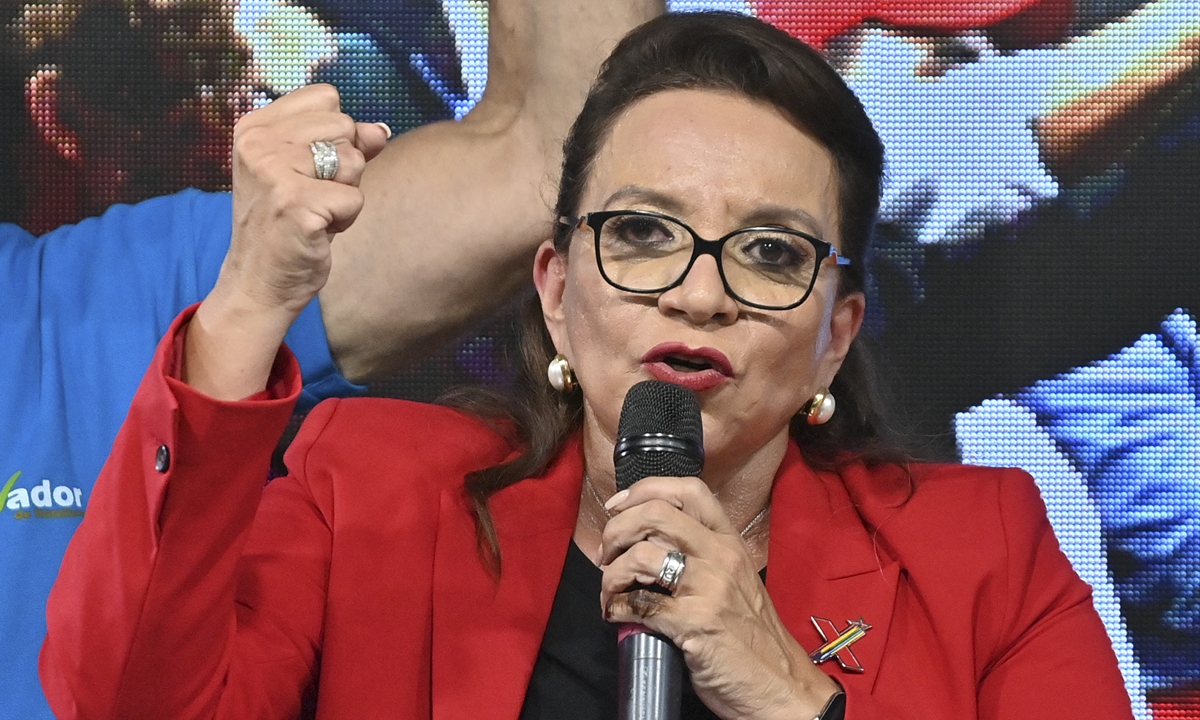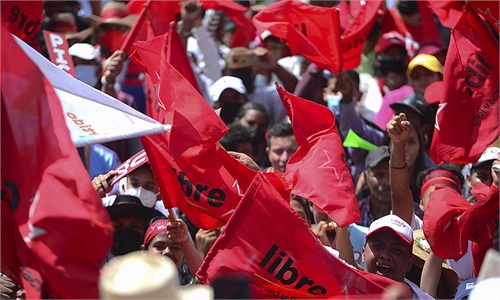
Honduran opposition candidate Xiomara Castro. Photo: AFP
Will the island of Taiwan lose another "diplomatic ally?" As the results of the Honduran elections are coming in, the answer to this question will be increasingly obvious.According to preliminary count of the Honduran Electoral Commission (CNE), the opposition candidate Xiomara Castro is holding a commanding lead. She has received more than 53 percent of the votes. Castro, who campaigned that she would open diplomatic relations with the China if elected, claimed election victory and said in a speech on the election day that "only people can save people."
Cutting ties with the Taiwan authorities in favor of the Chinese mainland was an important campaign pledge of Castro. Regardless of whether it's an electoral tactic to distance herself from the incumbent administration, this proposition has proved to be successful. Whether or not the wife of a former president will actually start the process of breaking off "diplomatic relations" with the Taiwan authorities, the campaign pledge she put forward has indeed awakened a large number of Hondurans to buy into the idea.
However, it takes time for this campaign proposition to be translated into political practice when Castro comes into office. We have to wait and see whether she will honor her pro-China promise. The political leader would need ambition and personal determination to realize the proposition. She would have to build a domestic consensus and resist the US pressure at the same time.
For many Central American countries, remittances from North America are their main economic source while their domestic economies are totally dependent on the US. The US has a strong influence on these countries, whether in economy, security or political terms. Therefore, the US has a strong leverage to intervene in their diplomatic process with China. The White House has always adopted a carrot-and-stick policy toward Latin America, and a tougher policy toward the Central American countries - whether it is Trump's disdain for Latin America or Biden's return to the Americas, it is nothing more than a difference in degree.
Washington has ramped up efforts to use the Taiwan question to restrain Beijing. If Castro really wants to fulfill her promise to sever "diplomatic ties" with the Taiwan authorities, it's anticipated the US will use various means to obstruct the process. None of island of Taiwan's "allies" will be so foolish to choose between the Chinese mainland and Taiwan. They are in fact weighing between China and the US. Honduras needs to consider the economic, political and security pressure from the US if it wants to establish diplomatic ties with China.
Nevertheless, if the incoming president of Honduras is unwilling to be a mediocre politician and a transitional president, but wants to bring revolutionary changes to the country, then he or she should resist this pressure, choose the right path and make Honduras operate as a normal country in the international community.
Panama, the Dominican Republic, and Salvador have created a demonstration effect for the whole region of Central America. If Castro has realized it, she should have known what to do next.
Like Honduras, the Taiwan authorities' other so-called diplomatic allies need to make a proper choice in accordance with historical trend as soon as possible. If they have not established diplomatic relations with China until the day when China will have achieved its reunification, they will surely be embarrassed.
Central America, where Honduras is located, is the region where most of Taiwan island's "diplomatic allies" are located. Among these countries, Honduras is somewhat special.
First, Honduras is a relatively large country in Central America in terms of geographical range. Second, over the past few years, in both the leftist administration in the early stage and the right-wing administration after the coup, some factions in Honduras have developed a strong desire to establish diplomatic relations with China. Although it has not become the mainstream, some politicians, businesspeople and social elites have been promoting this course. Third, with the development of economic and trade exchanges between the Chinese mainland and Honduras, especially after the establishment of diplomatic relations between China and three regional countries, there are an increasing number of elites in Honduras who see establishing diplomatic relations with China an urgent task.
If Honduras establishes diplomatic relations with China, the possibility that it will cause a domino effect leading other Central American countries nearby Honduras and the Caribbean countries to sever "diplomatic" ties with the island of Taiwan cannot be ruled out.
Meanwhile, for those countries which are serving as US pawns in provoking China over the Taiwan question, they should make a serious reflection over which side of history they should take and learn something from Honduras.
When countries like Honduras are ready to cut "diplomatic" ties with the Taiwan island, some politicians in other countries like Lithuania are provoking China for temporary short-term economic benefits over the Taiwan question. The latter will lose more than they will gain. They will nail themselves to the pillar of shame in history, leading their country to the wrong direction.
A future trend is that the number of "diplomatic allies" of the Taiwan island will become smaller and smaller. Public demands for normalizing relations with the China are accumulating among Taiwan island's "diplomatic allies," so are the political and elite forces that support a normalized relationship growing. With the development of the trade and economic ties between those countries and the Chinese mainland, more and more people are realizing the situation.
The author is executive director of the Latin American and Caribbean Region Law Center of China University of Political Science and Law.

